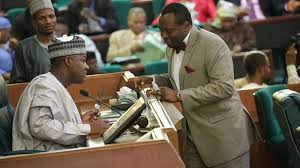Opinion
Why El-Rufai Is Misunderstood
The Kaduna State
governor, Mallam Nasir Ahmad El-Rufai, relishes controversy. Lately, he was slammed the “death” penalty by the founder of Omega Fire Ministries, Apostle Johnson Suleiman, for a bill he initiated to regulate religious activities in his state. The bill awaits public hearing and final presentation for third reading in the state Assembly.
Titled: “A Bill for a Law to Substitute the Kaduna State Religious Preaching Law 1984”, the bill is said to be a replication of the 1984 law enacted by the military with modifications. Following protracted religious conflicts in the state, the military administrations at the time enacted the law to check the activities of radical preachers who had been accused of sparking off crises with their utterances.
Kaduna is a cosmopolitan state. Since its creation, it has witnessed one form of violent conflict or the other with heavy casualties, thus making it one of the most volatile and vulnerable states in the country. The conflicts range from boundary and land disputes, religious crises, political violence, ethnic clashes, chieftaincy tussles etc.
Some of the violent clashes that had engulfed the state include the Maitatsine riot of 1980, the 1987 Kafanchan crisis, 1992 Zango Kataf crisis, 2000 Sharia conflict, post presidential election violence in 2011 and the recent Shi’ite/army clash that would have resulted in a bigger crisis but for the state government’s intervention.
The state government has consistently defended the proposed law, claiming that it does not have ulterior motives neither does it contravene Section 45(1) of the 1999 Constitution; rather it seeks to ensure that religious preaching and activities in the state are conducted in apple pie order for public bid and safety. But who cares to listen when everyone is up in arms?
However, critics of the bill have pointed to its inconsistency with Sections 38 and 39 of the Constitution which protect the rights of citizens to freedom of thought, conscience and religion. What is being suggested here is that the bill restricts preaching and would therefore limit conversion. Its opponents also allege that it will transfer the leadership of the religions to the board it seeks to create.
Now, how does this bill look like? First, it proposes the establishment of regulatory bodies for the two major religious groups. It also proposes the establishment of two committees, one from Jama’atau Nasir Islam (JNI) for the Muslims and the other from the Christian Association of Nigeria (CAN). It recommends the establishment of an inter-faith ministerial committee to supervise both the JNI and CAN.
The two committees will issue licenses approved by the ministerial committee to preachers which is renewable annually, while a visiting preacher will be issued license to cover the period he will preach. Similar committees will be replicated in the local government areas. Both JNI and CAN are empowered by the bill to keep records of all churches and mosques and the data of preachers.
Other proposals by the bill include restriction on the playing of all communication gadgets containing religious recordings to one’s house, the church, mosques and other designated places of worship. The bill further prohibits the playing of cassettes that use abusive language against any person, religious organizations or their leaders.
Furthermore, it makes it an offence for anyone to preach without license, play a religious cassette or uses a loud speaker after 8pm in public places; use a loud speaker for religious purposes other than inside a mosque or church and surrounding areas outside the prescribed prayer times.
Abuse of religious books, inciting disturbances of public peace, abuse or use of any derogatory term in describing any religion or the carrying of weapons of any description in places of worship or to any other place with a view to causing any disturbances are equally offensive. The bill makes all infractions punishable by a term not exceeding two years imprisonment or a fine of N200, 000 or both.
This executive bill by the state government has generated great controversy among leaders of the two major religions (Christianity and Islam) in the state as well as stakeholders who are split on the propriety or otherwise of the proposed law. While it is being upbraided in some quarters, others have applauded it as a step in the proper direction.
El-Rufai’s bill is not new. Many countries have enacted laws to regulate religious activities in line with their peculiar circumstances. Even beyond our shores, France’s leading Muslim body, the French Council for the Muslim Religion (CFCM), announced, in the wake of the last terrorists’ attacks that, Imams would have to be licensed after their theological knowledge is tested particularly for their “tolerance” and “openness”.
What is wrong with El-Rufai’s bill and why is it vilified? Have those who criticize the draft legislation bothered to peruse it and point out the sections that are offensive to the governor as he has always demanded? While some of the provisions of the bill are unacceptable, I think the governor has a responsibility to protect those he governs. And one way to actualize it is to enact a law to check dangerous religious activities in his state. I disagree with those who claim that the bill will infringe on their fundamental rights. Such rights are not absolute and that is why the state can regulate them to accommodate others’ rights.
Finally, and I think this is very important. I don’t question the governor’s intention, but since laws are about people, El-Rufai must listen to dissenters from the bill and take their views seriously. This means he has to consult more widely, meet with critics and representatives of all religions in the state, and return with a more acceptable bill. Why El-Rufai has been so misunderstood is because he has projected his intention well above good approach. This must change if his bill must have a dint of a fighting chance.
Arnold Alalibo
Opinion
Kids Without Play Opportunities

“All work and no play”, its said, “makes Jack a dull boy.” Despite this age-long maxim that recognises the role of play in early childhood development, play appears to be eluding many Nigerian kids. The deprivation of play opportunities comes in different forms for the Nigerian child depending on family’s social setting or status, but the effect is much the same. For children in Nigerian poor families, life is becoming as much a hassle as it is for their struggling parents. Due to harsh economic conditions, many families resort to engaging their kids prematurely in trading activities especially in hawking, to help boost family revenues, when these kids should be enjoying leisure after school. Some of these children barely attend schools while being forced to spend much of their childhood hustling in the streets. For children from well-off families, time could be as crunchy as it is for their busy parents when, obsessed with setting agenda for the future of their kids, parents arrange stringent educational regiment too early for their kids.
These group of children are made to get-off the bed by 5.30am every weekday, get ready for private school buses that call at 6.00am, otherwise report by however means to school at 7.20am.The situation is worse for kids in the city of Lagos where the need to beat urban traffic rush-hours is very high. Most children are further subjected to extra hours of lessons after school at 2.00pm, only to be released with loads of homework. On many occasions children who leave home for school at 6.30am get back by 3.30pm. With hardly enough time to eat, do school assignments and take afternoon naps, these children hardly had time for plays before dinners. In Nigeria, kids of ages between 3 and 12 spend averages of 9 hours a day and 45 hours a week to and from schools, and additional hours doing home assignments and domestic jobs, whereas their peers in developed countries spend about half that duration and have more time for leisure.
Any remaining spare time left after school work or street hustle is further stolen, when kids who usually are fascinated by gadgets, are exposed to household electronics like phones, tablets and gaming consoles. Electronic games may create a sense of leisure, but the difference with human interactions is that kids doing games interface mostly with machines or with programme structured in ways that entrap a child’s pysch directionally, according to the game’s programming, in ways that may not encourage independent thinking. Moreso, attraction to such gadgets displaces kids’ attention from important television and radio programmes. The prevalent tight, academic schedules for some Nigerian kids, though intended for academic excellence, encroaches on childhood leisure time needed to achieve an all-round childhood development, and could make children to resent formal education altogether. Besides, academic excellence or economic pursuit, is not all there is to living a well-nurtured life.
Children’s leisure time, defined as time left over after sleeping, eating, personal hygiene and attending school or day-care, is very crucial to childhood development. Sociologists recommend that children should have at least 40 per ceny of the day as leisure. According to Berry Brazelton, a former pediatrician at Harvard Medical School, “Play is the most powerful way a child explores the world and learns about him or herself.” Unstructured play encourages independent thinking and allows the young to negotiate their relationships with their peers, and in the process build self-confidence and self-control. Play is one of the important ways in which young children gain essential knowledge and skills. Leisure time enhances learning as fun enables children to learn at their own level and pace. Young children naturally explore and learn many skills by making cognitive connections from events that catch their attention.
Unstructured plays help children developed their cognitive, physical and communication skills that make them acquire social qualities necessary in navigating relationships in adult life. Plays enable children assess how others feel and learn perspectives as well as empathy through observing differences in facial expressions, body language and even tone of voice, which helps them copy how to express themselves to others, and therefore develop socially acceptable behavours that build relationships. In cooperative activities, children willingly take things in turn and may delegate roles. Children can also share the glory of winnings through competitive games, which is all great for working together in task sharing. Aside encouraging parents to ensure adequate leisure time for their kids at home, schools should make plays and exercises an integral part of the educational curriculum. The educational curriculum set by the Nigerian Educational Research and Development Council (NERDC) includes specific training durations and break periods, as well as sporting activities, as part of the school system.
Due to poor government funding, sports in public schools have declined, while most private schools lack sporting infrastructure or even play grounds. These make recreational activities and sports implementation almost impossible in schools. Also, the increasing rate of urbanisation in Nigerian communities is gradually eroding ancient playgrounds, while established urban centres have lost community playgrounds. With tightening apartment spaces now being the norm in most urban residential areas, many kids are forced to wriggle within burglary-proof enclosures. Nigerian governments and the relevant agencies should ensure that existing child labour protection laws, educational and urban development codes are implemented in the country, to enable proper nurturing of children as the future stakeholders of our society. Private schools, especially, should be supervised to ensure they follow the educational curriculum standards set by NERDC.
In a bid to impress parents and draw more patronage as better option than public schools, private schools, most of whom operate in cramped environments, have continued to set high regiments of training schedules beyond the capacity of most kids, and even encourage enrollment of pre-school age kids who can not sit still to listen for an extended periods of time. Schools, from creche to secondary levels, without playgrounds and recreational facilities should not be allowed to operate, and should be made to understand and implement appropriate curriculum and training durations. Many Nigerian kids, whether from rich or poor families, appear to have been set-up inadvertently, in the same leisure denial that affects their parents. All work and no play could lead to some messed-up kids who grow up not understanding social cues, and being unemotional and self-centered, manifest later as obsessive-compulsive adults.
By: Joseph Nwankwo
Opinion
Congratulations Fubara, Joseph Of Rivers State

We thank God who is above all human contrivance and arrogance. Congratulations, Your Excellency Amaopusenibo Sir Siminalayi Joseph Fubara. Your victory takes us back to the Bible as a living document of a God that rules in the affairs of all His creation. In a manner of speaking, welcome back from your first war with Phillistines, Your Excellency! Yes, first example is David and Goliath! And like David, Your Excellency stands over Goliath in victory. But that is not enough. Our real enemy is that Your Excellency is Governor of a State with a wretched economy. Indigenes of Your State are today reduced to battalions of beggars waiting for who will hire their loyalty on the usual “pay-as-you-go” basis.
Your Excellency, it brings us to another Bible- based parallel. Conscientious Rivers indigenes above 50, should identify with and commit our all to this second parallel. It is to liberate the economy and people of Rivers people from 23 years enslavement and poverty, for us to regain our dignity and pride. When the economy of Egypt was drifting into a disaster zone, even Pharaoh did not know it. He also did not know what to do. But God sent a Joseph to build the economy into a fortress of good fortune that overcame the economic and social disaster Egypt did not know was ahead. Your Excellency for 23 years, Rivers State has been ruled without any logical, credible and consistent PLAN of how to overcome mass poverty from our dehydrated local economies.
Your Excellency, Rivers State cannot survive one month without Federal allocation! So called IGR only about 10 per cent of Federal allocation.It is also not based on what we produce but on tax from other people’s productivity that pass through our State. Pharaoh did not know what to do in the case of Egypt. May it please God to position another Joseph in Governor Siminalayi Joseph Fubara to heal Rivers State and build an economy that all Africa will come to access in order to chart a new course out of worsening economic hardship that is caused by near zero investment in productivity and endemic reckless looting. They are the twin chambers nursing a corporate cancer unfolding across Nigeria and Africa. The hard work begins today, Your Excellency.
We need an economic blueprint that will enrich every Rivers senatorial district from investment to grow productivity and to enrich every Rivers person from career-based productive labour, just as Pharaoh was enriched by Joseph’s economic Blueprint. Let Rivers State stop the trend of waiting the lives of young Rivers people recruited by Phillistines into cultism, thuggery and easy money, as a career. These Phillistines believe they have only lost one phase of many legal battles and battles by other means. But from comments in the public media, their eyes are fixed on 4-years of war and more! Your Excellency, we the people will not let you forget what you owe us. We have to make unbelievers see that your leadership is different and that we are uprooting the old order of an unproductive Feudal System. That system makes a few persons and their cronies to monopolise our collective wealth, while the majority are left in misery. Let’s put an end to enslavement by cabals and mass poverty in Rivers State. That is when the Phillistines will surrender.
By: Amaopusenibo Brown
Opinion
Reserved Seats for Women: A Step Forward
-

 Business3 days ago
Business3 days agoCBN Comptroller Warns Against Naira Sale
-

 Politics3 days ago
Politics3 days ago2027: Nigerians Victims Of Desperate Politicians – Cleric
-

 Business3 days ago
Business3 days agoReal Estate GDP Contribution Surges To N41.3tn
-

 Politics3 days ago
Politics3 days agoObasanjo, Tinubu Mourn Audu Ogbeh’s Death @78
-

 Business3 days ago
Business3 days agoFreight Forwarders Raise Alarm Over Govt Reforms Sabotage
-

 Maritime3 days ago
Maritime3 days agoMWUN, Police Parner In Safer Port Operations
-

 Business3 days ago
Business3 days agoFlight Distruption Looms, As Aviation Workers Prepare For Strike
-

 Maritime3 days ago
Maritime3 days agoNSC Hails MARAN’s Effords At Developing Maritime Sector

